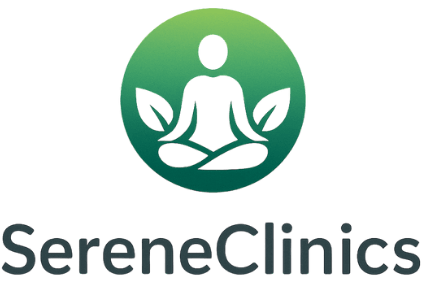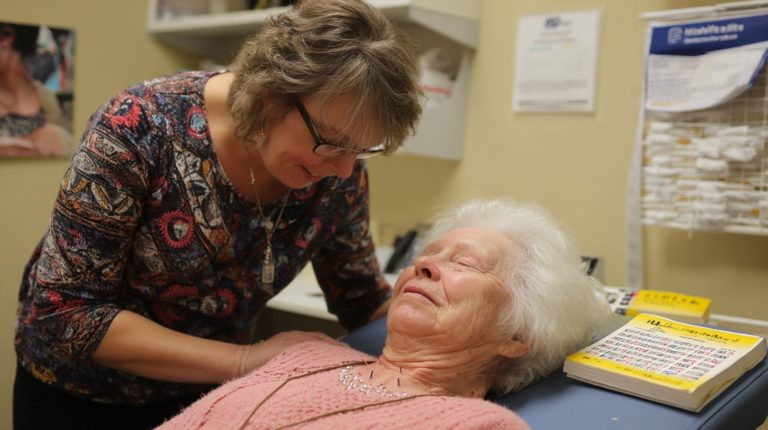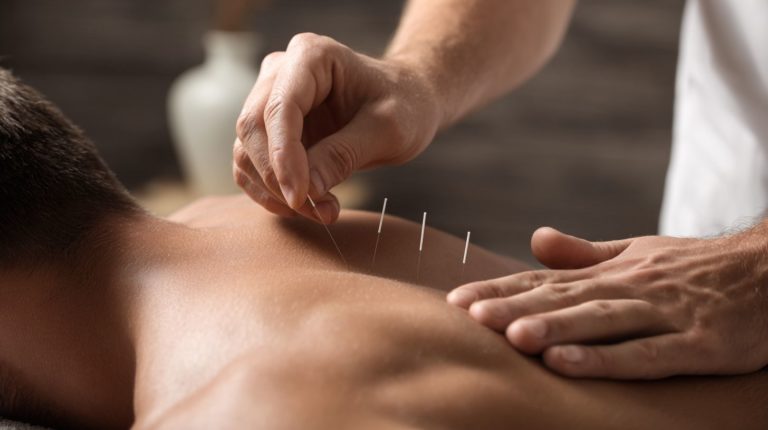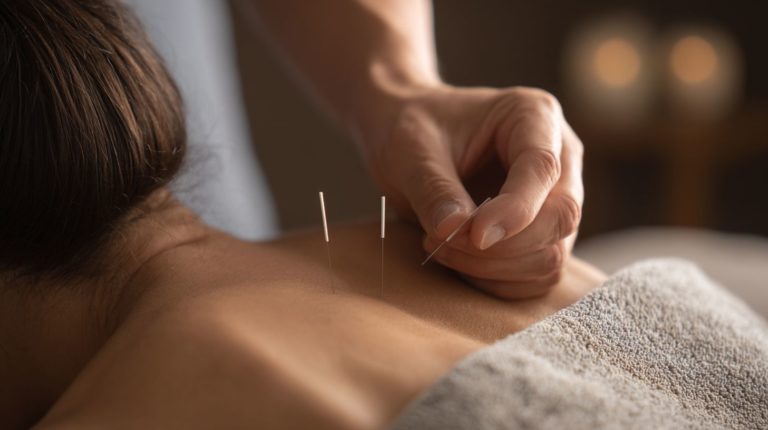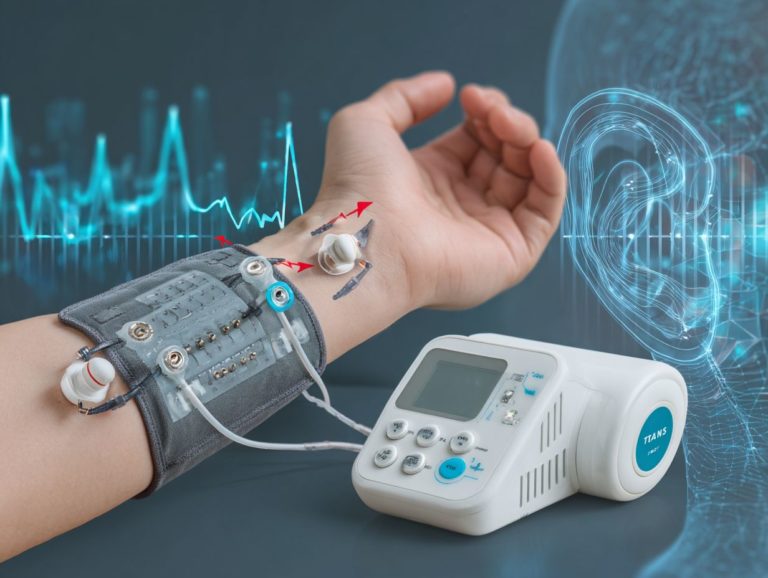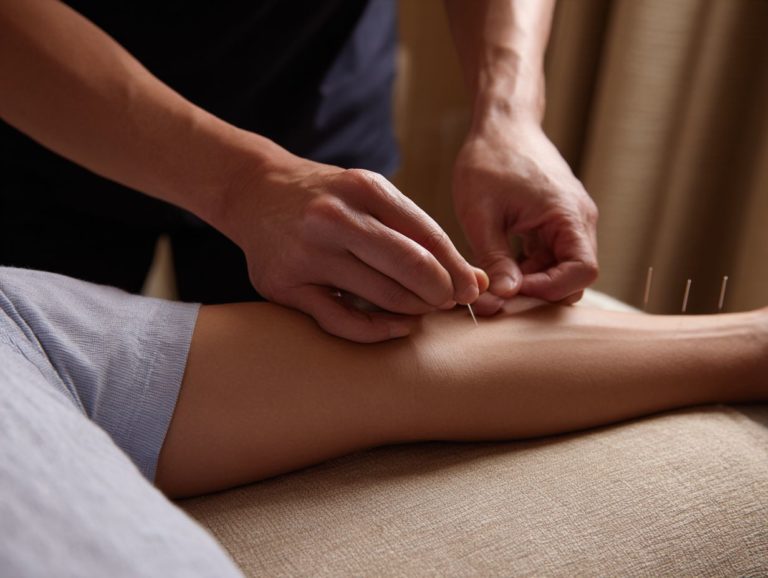Acupuncture Practices in the US: Regulations and Standards
Acupuncture, an ancient healing practice rooted in Traditional Chinese Medicine, has gained significant popularity in the United States over the years.
As more people use it, knowing the regulations and standards that govern its practice.
This article explores the history of acupuncture in the US, the licensing and safety requirements for practitioners, and the varying regulations by state.
It discusses how to find a reputable acupuncturist, their benefits, and potential risks.
Whether you’re considering acupuncture for the first time or looking to learn more, this guide will give you valuable insights.
Key Takeaways:
Contents
- 1 What is Acupuncture?
- 2 History of Acupuncture in the US
- 3 Regulations and Standards for Acupuncture in the US
- 4 Acupuncture Regulations in the US
- 4.1 Regulation Statistics: State Legislation Overview
- 4.2 Regulation Statistics: Certification Requirements
- 4.3 Regulation Statistics: Legislative Developments
- 4.4 What are the Licensing Requirements for Acupuncturists in the US?
- 4.5 What Are the Safety and Hygiene Standards for Acupuncture Practices?
- 4.6 What are the Scope of Practice Guidelines for Acupuncturists in the US?
- 4.7 What are the Continuing Education Requirements for Acupuncturists in the US?
- 5 How are Acupuncture Practitioners Regulated in the US?
- 6 How to Find a Reputable Acupuncture Practitioner in the US?
- 7 What are the Benefits and Risks of Acupuncture in the US?
- 8 Frequently Asked Questions
- 8.1 1. What are the regulations for acupuncture practices in the US?
- 8.2 2. Is a license required to practice acupuncture in the US?
- 8.3 3. Are there any specific standards for acupuncture practices in the US?
- 8.4 4. Are there any safety regulations for acupuncture in the US?
- 8.5 5. Can anyone perform acupuncture in the US?
- 8.6 6. How can I verify the credentials of an acupuncturist in the US?
What is Acupuncture?

Acupuncture is a method from traditional Chinese medicine that uses thin needles inserted at certain spots on the body to help with different health problems.
Often used to manage pain, acupuncture is now recognized in the United States as a helpful additional therapy, especially for long-term pain issues. Its effectiveness is backed by many studies, including those by the National Institutes of Health, which show its role in complete healthcare and pain management. A notable example is a consensus statement by the National Institutes of Health, which further emphasizes acupuncture’s efficacy and integration into medical care. The techniques involved in acupuncture, such as needle placement and the sensations they produce, are crucial to its success, as detailed in [this comprehensive guide on acupuncture points and techniques](https://sereneclinics.com/holistic-health/traditional-medicine-systems/traditional-chinese-medicine/acupuncture/acupuncture-for-pain-relief/acupuncture-points-techniques/).
History of Acupuncture in the US
Acupuncture’s history in the United States began in the 1970s when journalist James Reston wrote about its benefits after receiving treatment in China. This pivotal moment was detailed in The New York Times, sparking growing interest among American doctors and the public.
Over time, acupuncture went from skepticism to becoming an accepted method in many medical fields, influencing health care and pain management approaches.
Regulations and Standards for Acupuncture in the US
In the United States, acupuncture is controlled by various regulations that vary from state to state. These regulations require practitioners to complete specific education and training before they can receive acupuncture licenses. If you’re curious about how these state requirements compare to other holistic practices, our exploration of naturopathic practice regulations offers valuable insights.
State acupuncture boards and other authorities establish these regulations to protect patients and maintain high-quality acupuncture treatment.
Acupuncture Regulations in the US
Acupuncture Regulations in the US
Regulation Statistics: State Legislation Overview
Regulation Statistics: Certification Requirements
Regulation Statistics: Legislative Developments

The dataset on Acupuncture Regulations in the US gives a clear summary of the laws related to acupuncture in various states. This set of rules is important for keeping professional standards and protecting patients who are looking for acupuncture treatments.
Regulation Statistics show us how state laws regulate acupuncture Currently, 47 states have acupuncture laws, highlighting widespread recognition of acupuncture as a legitimate medical practice. However, there are differences in who can perform acupuncture and the rules they must follow. Notably, 32 states allow medical doctors (MDs) to practice acupuncture without specific training in the field. This could raise concerns about the quality of care, given that acupuncture requires specialized skills and knowledge distinct from general medical practice. Furthermore, 7 states allow chiropractors (DCs) to practice acupuncture without specific training, with another 7 states having undetermined regulations on chiropractor practice, indicating an area ripe for further legislative development.
The section on Certification Requirements emphasizes the importance of standardized qualifications for acupuncture practitioners. 30 states mandate certification from the National Certification Commission for Acupuncture and Oriental Medicine (NCCAOM), ensuring practitioners meet established competency standards. Additionally, 47 states have specific tests needed to get a license, underscoring a commitment to maintaining high professional standards across the majority of the U.S.
In terms of Legislative Developments Acupuncture’s path to being acknowledged started in 1973 when the first acupuncture law was enacted. This milestone marked the beginning of integrating alternative medicine into mainstream healthcare. However, the data also reveals that 3 states remain exempt from any certification requirement There is a need for regular changes in the law to fill gaps and keep uniform standards across the country.
Changes in acupuncture regulations show important steps in making the practice more professional. The information indicates that there are still opportunities to better match training and certification standards to improve the quality and safety of acupuncture services nationwide.
What are the Licensing Requirements for Acupuncturists in the US?
To get a license to practice acupuncture in the United States, people need to meet certain educational standards. This typically involves earning a master’s degree from an approved acupuncture school and receiving further education in acupuncture techniques and patient care. After fulfilling these educational criteria, candidates must pass a national examination to obtain their acupuncture licenses and practice legally.
- The steps to get a license can differ greatly from state to state. For instance, some states may require additional examinations or specific coursework, while others may have unique clinical experience mandates.
This inconsistency shows the need to join approved programs that give thorough training and get students ready for the exact rules of the states where they plan to work. For an extensive analysis of this trend, our deep dive into choosing an acupuncture practitioner explores the necessary steps and credentials needed.
Accreditation confirms that programs meet education standards, making professionals more reliable and trustworthy in the growing field of acupuncture, where giving top-quality patient care is essential.
What Are the Safety and Hygiene Standards for Acupuncture Practices?
Safety and cleanliness are essential parts of acupuncture practices to keep patients safe and reduce the risk of problems or infections. Regulatory bodies enforce strict hygiene protocols that practitioners must follow, including the use of sterilized needles and maintaining a clean treatment environment.
Practitioners routinely wash their hands and use personal protective equipment to create a barrier against potential contaminants. It’s also essential for acupuncturists to dispose of needles and other waste properly, adhering to biohazard regulations, to prevent any health risks. According to guidelines recommended by OSHA, these practices are crucial for maintaining a safe health program management.
By upholding these strict standards, practitioners offer effective treatment and reassurance for patients. By focusing on cleanliness and safety, the acupuncture field strengthens its reputation and helps gain the trust of patients who choose different treatment options.
What are the Scope of Practice Guidelines for Acupuncturists in the US?
The scope of practice guidelines for acupuncturists in the United States define the range of services that licensed acupuncture practitioners are authorized to provide, which varies by state and is influenced by regulatory agencies. These guidelines help acupuncturists work within their skills and follow set treatment rules.
States like California offer a broader scope, allowing for additional modalities such as herbal medicine and electro-acupuncture, while others may be more restrictive, impacting the types of treatments available to patients. For those interested in the nuances and effectiveness of these additional modalities, such as electro-acupuncture, see also our comprehensive guide on Electroacupuncture: Effectiveness, Guidelines, and Safety.
This difference can greatly impact patient treatment and the education of practitioners, ensuring that individuals looking for acupuncture receive care that is both safe and effective.
It’s important for professionals to know these regulatory details so they can follow state laws and improve their treatments to better meet their clients’ needs.
What are the Continuing Education Requirements for Acupuncturists in the US?
Continuing education is important for acupuncturists in the United States because it helps them stay current with new acupuncture techniques, treatment effectiveness, and patient care practices. Most states require licensed acupuncturists to complete a specific number of continuing education units (CEUs) to maintain their licenses and certifications.
This regular training enhances their job skills and keeps them updated on the latest research and advances in holistic medicine.
By engaging in specialized workshops, webinars, and conferences, acupuncturists can deepen their knowledge and apply innovative methods in their practice. This dedication to ongoing education directly improves the skills of practitioners, allowing them to provide the best care to their patients.
It creates an environment of professionalism and responsibility, promising patients that their acupuncturist is well-prepared to handle various health problems with the best treatments available.
How are Acupuncture Practitioners Regulated in the US?
Acupuncture practitioners in the United States are governed by state-specific rules set by different regulatory bodies and acupuncture boards. These regulations make sure that practitioners have the required qualifications and follow ethical guidelines.
This system is important for keeping patients safe and maintaining the trustworthiness of acupuncture as a healthcare practice.
What are the Different Types of Acupuncture Practitioners in the US?
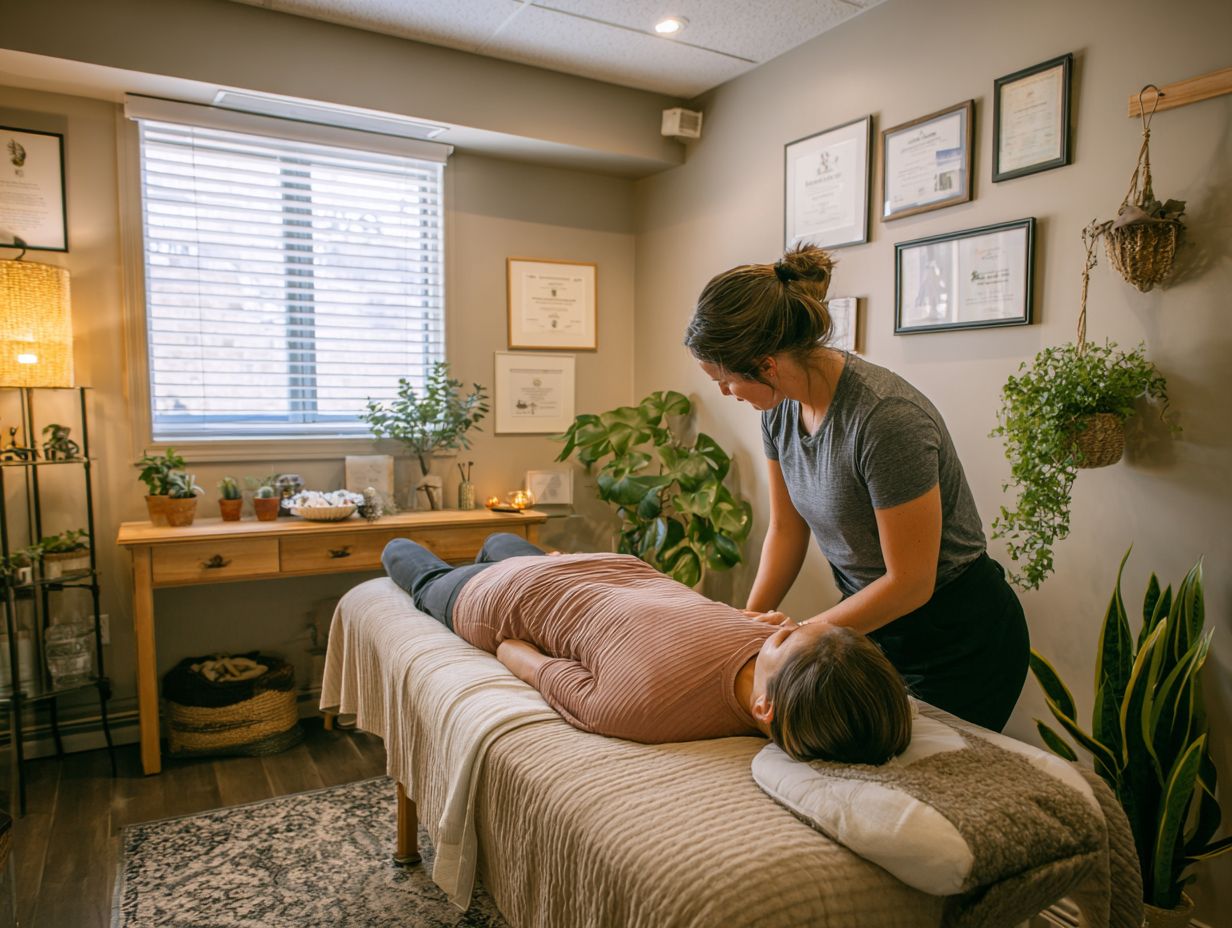
In the United States, there are various types of acupuncture practitioners, including licensed acupuncturists who have completed extensive training in traditional acupuncture techniques and physician acupuncturists who have undergone additional training in medical acupuncture as part of their medical education. Each type of practitioner may offer unique approaches to acupuncture treatment, depending on their background and training.
There are other types of practitioners such as traditional Chinese medicine (TCM) practitioners, who use herbal medicine and whole-body approaches in their treatment plans.
The qualifications differ widely depending on the type. Licensed acupuncturists usually complete a master’s or doctoral program in acupuncture or Oriental medicine. On the other hand, doctors who practice acupuncture might only take extra courses on acupuncture techniques.
The different educational backgrounds greatly affect their clinical practices. This affects how they handle diagnosis, interact with patients, and manage treatment results.
Therefore, people looking for acupuncture treatment should think about these differences because each practitioner has their own approach based on their training and experience.
What are the Differences in Regulations for Acupuncture Practitioners in Different States?
Regulations for acupuncture practitioners vary significantly across different states in the US, with each state establishing its own requirements for licensing, education, and practice scope, often influenced by local acupuncture boards and regulatory agencies. This disparity can impact how acupuncture is practiced and the types of services that are legally permitted.
For example, in California, acupuncturists must finish at least 3,000 hours of training and pass a challenging test. This allows them to practice different natural health methods.
In contrast, New York mandates a similar educational requirement but has implemented stricter guidelines regarding the use of certain techniques and herbal prescriptions.
Virginia has recently changed its rules, letting more people access acupuncture, which helps patients looking for alternative treatments.
These differences affect how practitioners work and impact patient access to acupuncture treatments, resulting in different experiences across states.
How to Find a Reputable Acupuncture Practitioner in the US?
Finding a trustworthy acupuncture practitioner in the United States is important for getting good treatment and staying safe.
You should look into possible practitioners by verifying their qualifications, like acupuncture certifications, education, and clinical experience.
Also, get suggestions from reliable people in the healthcare field.
What are the Important Factors to Consider when Choosing an Acupuncture Practitioner?
When choosing an acupuncture practitioner, you should think about their training, credentials, and how they treat patients. Checking that the acupuncturist is certified and follows safety guidelines will make your treatment better.
You should check their areas of training because some might be better at managing pain, while others might have more experience with stress-related issues or treating specific problems like fertility or migraines.
Knowing their treatment philosophy can be important; a practitioner who focuses on treating the whole person may provide more thorough care.
Consider how they interact with patients; good communication and a supportive environment can greatly influence the effectiveness of the treatment.
Potential clients should not hesitate to ask questions about the acupuncturist’s methods and how they tailor treatments to individual needs.
What are the Red Flags to Watch Out for when Choosing an Acupuncture Practitioner?
When choosing an acupuncture practitioner, it is essential to be aware of red flags that may indicate unprofessionalism or unsafe practices, such as lack of proper licensing, insufficient training or experience, and failure to follow safety protocols. Spotting these warning signs can help keep patients safe and lead to effective care.
Plus checking credentials, potential patients should be vigilant about the cleanliness and hygiene standards of the practice environment.
A reliable acupuncturist should keep their workspace clean, use sterilized needles, and follow health rules to prevent any risk of infection.
It’s also critical to notice how they communicate; if an acupuncturist dismisses your concerns or fails to provide detailed information about the treatment process, it may indicate a lack of professionalism.
Unsolicited testimonials and guarantees of results should raise a red flag, as effective acupuncture relies heavily on individual responses and does not yield one-size-fits-all outcomes.
Ensuring the provider creates a welcoming and patient-centered setting can lead to effective treatment.
What are the Benefits and Risks of Acupuncture in the US?
Acupuncture can help with pain relief, better health results, and a better life for people with long-term illnesses.
However, like any medical treatment, acupuncture has some risks that doctors and patients should know about to provide safe and effective care. For those considering acupuncture, understanding the different techniques and benefits can be invaluable in making informed decisions.
What are the Common Benefits of Acupuncture?
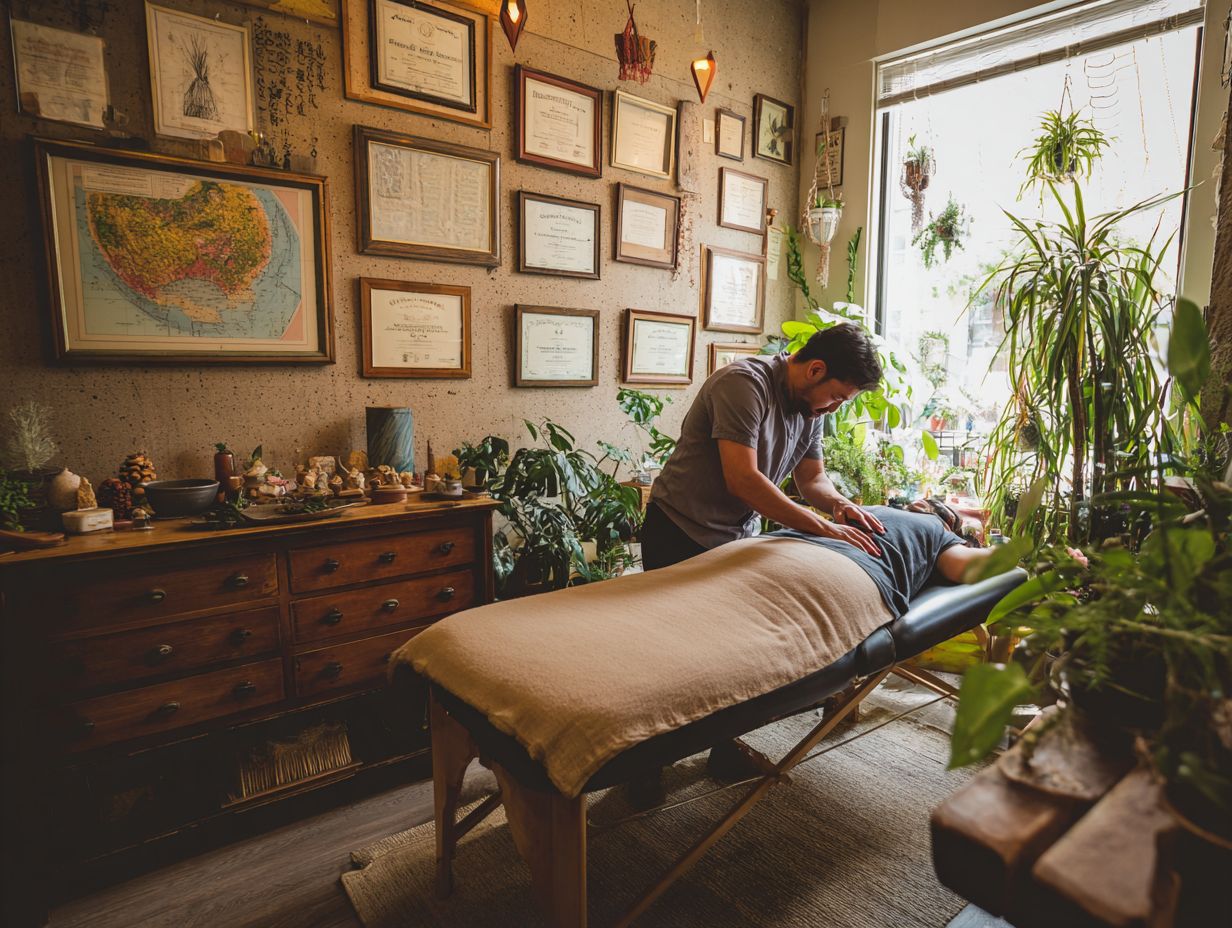
Common benefits of acupuncture include its effectiveness in pain management, particularly for chronic pain conditions such as back pain, joint pain, and migraines. Many patients report significant improvement in their symptoms and overall well-being after undergoing acupuncture treatments.
Research backs these claims. A review published in the Journal of Pain found that acupuncture can significantly reduce pain intensity and improve physical ability.
Research from the National Institutes of Health showed that acupuncture is effective in treating headaches and neck pain. The study indicates that acupuncture helps the body release endorphins, which are natural painkillers.
Research shows acupuncture can reduce anxiety and depression symptoms, offering a helpful option for those looking for alternative treatments.
By focusing on both the physical and the mental and emotional aspects of pain, acupuncture provides a complete method for health and wellness.
What are the Potential Risks and Side Effects of Acupuncture?
While acupuncture is generally considered safe, potential risks and side effects can occur, including bruising, soreness, and rarely, more serious complications if proper safety protocols are not followed. Patients must talk to their doctors about possible side effects to have a safe treatment.
This conversation helps explain what to expect during sessions and identifies any pre-existing conditions that might increase the chance of negative reactions.
Common side effects, such as dizziness or fatigue, can often be mitigated through proper practitioner training and adherence to established safety guidelines.
Practitioners should prioritize using clean needles and maintain hygienic practices to minimize infection risks.
Knowing about possible symptoms like long-lasting pain or swelling helps patients get advice early, improving how well and safely acupuncture works.
Frequently Asked Questions
1. What are the regulations for acupuncture practices in the US?
Acupuncture practices in the US are regulated by state laws, which vary in terms of requirements and restrictions. However, most states need acupuncturists to have a license and complete specific education and training.
2. Is a license required to practice acupuncture in the US?
Yes, a license is required to practice acupuncture in the US. Each state has its own licensing board and requirements, which typically include completing an accredited training program and passing a national board examination.
3. Are there any specific standards for acupuncture practices in the US?
Yes, there are national standards set by the National Certification Commission for Acupuncture and Oriental Medicine (NCCAOM). These standards include education and training requirements, as well as ethical and safety guidelines for acupuncturists.
4. Are there any safety regulations for acupuncture in the US?
Yes, acupuncture practices in the US must adhere to safety regulations set by the Occupational Safety and Health Administration (OSHA). These regulations include proper disposal of needles and maintaining a clean and sanitized treatment environment.
5. Can anyone perform acupuncture in the US?
No, only licensed acupuncturists or those under the supervision of a licensed acupuncturist can legally perform acupuncture in the US. In some states, medical doctors and chiropractors may also be allowed to practice acupuncture after completing additional training and obtaining a certification.
6. How can I verify the credentials of an acupuncturist in the US?
You can verify the credentials of an acupuncturist in the US by checking with the state licensing board or the NCCAOM. You can ask for their license number and check it with the relevant organization to confirm they are allowed to perform acupuncture in your state.

Sheetal Sharda has a background in CS. She got an interest in Holistic living back in 2018, and has since started exploring more into Naturapathy, Holistic Living, Yoga, and more. She got inspired to start SereneClinics to help people find reliable centers across the world.
